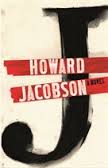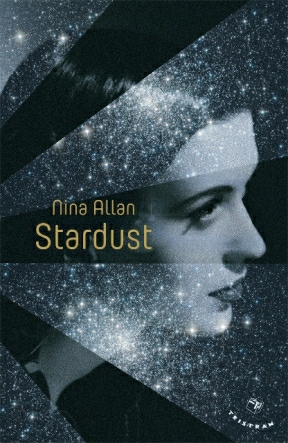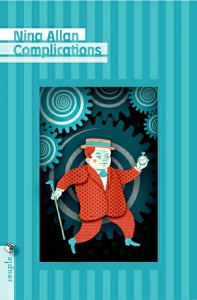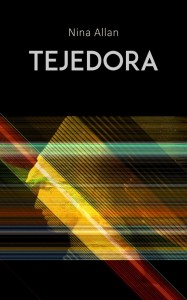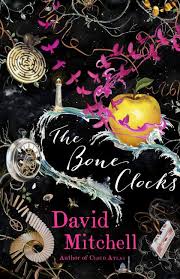 “Kevern, look. I don’t know when your mother did these, but they are of another time. Art has changed. We have returned to the primordial celebration of the loveliness of the natural world. You can see there is none of that in what your mother did. See how fractured her images are. There is no harmony here. The colours are brutal – forgive me, but you have asked me and I must tell you. I feel jittery just turning the pages. Even the human body, that most beautiful of forms, is made jagged and frightful. The human eye cannot rest for long on these, Kevern. There is too much mind here. They are disruptive of the peace we go to art to find.” (J, p 272)
“Kevern, look. I don’t know when your mother did these, but they are of another time. Art has changed. We have returned to the primordial celebration of the loveliness of the natural world. You can see there is none of that in what your mother did. See how fractured her images are. There is no harmony here. The colours are brutal – forgive me, but you have asked me and I must tell you. I feel jittery just turning the pages. Even the human body, that most beautiful of forms, is made jagged and frightful. The human eye cannot rest for long on these, Kevern. There is too much mind here. They are disruptive of the peace we go to art to find.” (J, p 272)
When the longlist for the Man Booker prize was announced two months ago, I expressed delight that David Mitchell’s The Bone Clocks had been selected – a choice that could only, I suggested, be good for speculative fiction’s relationship with the Booker – and surprise at the inclusion of Howard Jacobson. Not that the choice of Jacobson himself was anything out of the ordinary – he’s won the prize once already – but that in J he had produced a work that everyone seemed to agree was science fiction. I felt curious about that, to put it mildly, and thought it might be interesting in the run-up to the prize to read both works and compare them, to discover how two such outwardly dissimilar writers had chosen to approach speculative themes, to see which – if either – eventually made it through to the shortlist.
We now know the answer to that last – Jacobson’s J made the cut, Mitchell’s The Bone Clocks didn’t. But what of the books themselves? Mitchell’s novel was the bookies’ favourite right through the longlist period, with both mainstream and SFF critics expressing strong opinions about it, and its disinclusion came as something of a shock. Conversely, no one seemed to be talking much about J, and the previously Booker-crowned Jacobson appeared something of an outsider. At the time of the shortlist announcement I was about halfway through The Bone Clocks, and planning to move on to J as soon as I’d finished. Having now read them both. I think it’s safe to say that my opinions coming out of this particular reading experience are pretty much the opposite of what I expected. That in itself has made this mini-project worthwhile.
I went into The Bone Clocks from the position of having read all Mitchell’s previous works bar one (The Thousand Autumns) and considered them all well above average, both in terms of the writing itself and in terms of what Mitchell was trying to achieve with it. I had a particular fondness for Black Swan Green, and thought both the concept and execution of Cloud Atlas close to miraculous. I was expecting big things of The Bone Clocks, especially given that it had been widely tagged as Mitchell’s most openly speculative novel to date.
That is true – it is – but that goes no way towards mitigating the fact that in my opinion it is also Mitchell’s weakest novel by quite some distance. The mainstream critics who thought the novel was let down by its ‘plunge’ into fantasy in the fifth segment pointed to the rest of the novel – its five realworld sections – as proof of Mitchell’s gifts as a storyteller and a wordsmith. If only he’d ditch all this awful genre nonsense, they seemed to be saying, we might actually have a decent writer on our hands. Many of those same critics have pointed to Mitchell’s characterisation – and his portrayal of his central character Holly Sykes in particular – as the chief strength of the novel, but for me it felt patchy at best, bland for the most part, and dire at worst. Far from being a brilliantly realised creation Holly is something of a cipher, acting out the roles Mitchell requires for her rather than taking on any discernible life of her own. We learn little, if anything, of Holly’s interests or ambitions. As she appears in ‘A Hot Spell’ (the novel’s first long segment) she is deliberately set up to be a ‘typical’ fifteen-year-old girl, enamoured of the wrong boyfriend and looking for any excuse to cut loose from her parents. I found Mitchell’s realisation of the teenage mind unconvincing. He deliberately sets out to make Holly as ‘average’ as possible, scattering her speech with contractions and ‘causes, but his portrayal of her is inconsistent – he has Holly referencing Radio 4’s Thought for the Day at one point, and her stroppiness and decision to become a runaway feel like bolt-on elements, exercises in youthful alienation rather than the real deal. In contrast with the beautifully evoked, deeply felt ambience of Black Swan Green, the whole of this part one seems strangely flat, a recapitulation stripped of weight and personal investment. The checklist of references to contemporary politics and music has all the verisimilitude of stage decoration for a 1980s theme party. As the book progresses Holly becomes even less her own person, dragooned into action first as a winning waif pursued by an amoral serial seducer, then as the pissed-off partner of an obsessive war reporter (some of the dialogue that is given to Holly in that section is just awful) and as ‘mysterious other’ for a morally bankrupt author later on. We are asked to see Holly as ‘special’ – yet aside from the fact that she hears voices, we know nothing about her specialness, because we know next to nothing about her. We are interested in her because our attention is caught by the way she keeps cropping up throughout the book – but shorn of the forward momentum granted to her by the plot, there is remarkably little substance to Holly Sykes. She is wooden throughout, a narrative placeholder. When you consider the wonderful characterisation we saw in Cloud Atlas – the Sixsmith/Frobisher section contains some of the finest writing Mitchell has yet produced – and the brilliant portrayal of the teenager Jason in Black Swan Green, this is still more of a pity.
The most consistent character-building we find in The Bone Clocks comes in ‘Myrrh is Mine, its Bitter Perfume’ (the novel’s second segment) and ‘Crispin Hershey’s Lonely Planet’ (its fourth). The ‘hero’ of the former is Hugo Lamb, who gave a cameo appearance as Jason’s loathsome cousin in Black Swan Green and who appears here as an even more loathsome Cambridge undergraduate and amateur-soon-to-turn-professional sociopath. Hugo’s attitudes and behaviours are worse than vile, and he is brilliantly written. Equally so is Crispin Hershey, an embittered novelist who takes his revenge on a literary critic with appalling results. (In a recent interview on Radio 4’s Front Row, Mitchell insisted that the character of Hershey was not based on Martin Amis. Dessicated Embryos, he reminded us, was the title of a piano work by Erik Satie, not a backhanded reference to one of the younger Mr Amis’s early successes. But Red Monkey? Hal ‘The Hyena’ Grundy?? Come on.) Both Lamb’s portion of the narrative and Hershey’s are dynamic and vigorous, enlivened by moments of genuine comedy and, in Hershey’s case, pathos. A shame then that ‘The Wedding Bash’, part three of the novel and potentially just as interesting as the two sections that bookend it, turns out to be another misfire. Its protagonist Ed Brubeck was interesting in ‘A Hot Spell’ – intelligent, mature beyond his years and a bit of a loner, he came off the page far more forcefully than Holly. But when he reappears as a war journalist in ‘The Wedding Bash’, it seems to be for the sole purpose of expounding Mitchell’s views on Western intervention in Iraq and Afghanistan. It is not that one disagrees with Ed’s views – indeed the section might have been a lot more interesting if one had – but that they would appear to have zero importance to or impact on the novel as it progresses. I initially believed that Mitchell was playing a long game, that he would be bound to link this realworld war in some ingenious way with the ‘secret history’ that is revealed two hundred pages later. As it turns out, no – Ed Brubeck is just the author having a go at Tony Blair. Not a bad thing in itself, but not relevant to the story either.
Which brings us to the crux of this novel, or its downfall, depending on your point of view. In ‘An Horologist’s Labyrinth’, part five of the novel and its longest section, we learn that Holly has been a pawn in a larger game all along, a centuries-long battle between two opposing groups of immortals, the Horologists (the goodies) and the Anchorites (the soul-sucking baddies). It is these meddlesome demigods who variously ‘stole’ Holly’s brother, co-opted her lover to the dark side, helped her to find her missing daughter and plagued her with invisible voices from the age of seven. Now is the time of final reckoning, a fight to the death between the Blind Cathar and his Forces of Evil and our plucky band of Scoobies, outmanned in numbers but not in moral strength.
Where do we even start?? In his review for The New Yorker, the critic James Wood stated the following:
As soon as the fantasy theme announces itself…the reader is put on alert, and is waiting for the next visitation, which arrives punctually. Gradually, the reader begins to understand that the realism – the human activity – is relatively unimportant.
I earlier wrote a lengthy criticism of Wood’s essay, because it seemed and still seems to me that to equate ‘the human activity’ solely with the realist mode is to denigrate a mode of literature – the fantastic – whilst remaining ignorant of its capabilities. I stand by that assertion, and would go further in saying that Wood’s main purpose in this essay seems to lie in using The Bone Clocks as a proof of the inherent crapness of speculative fiction generally. I think he’s got it the wrong way round – one bad book is no proof of anything, and he doesn’t go anywhere near far enough in putting a rocket up The Bone Clocks for the direness of that fantasy section.
It is the imbalance that is so embarrassing, the use of the kind of broad brush gestures and clichéd dialogue that would and should not be taken seriously in any literary context. Contrary to what Wood says in his review, the best speculative fiction works precisely because the writer sees no inherent difference, in fictional terms, between the quotidian realm and the fantastical, and approaches the writing of each – characterisation, sense of place, the use of language – with equal care and weight. In terms of a story’s seriousness, whether the ‘human case’ to be examined resides in a fictional Glasgow or a fictional Gormenghast should be of little importance. Mitchell himself clearly understands this – even if some of the science fiction in Cloud Atlas feels a little clunky, there can be no doubt that Mitchell fought hard for the soul of that book and won. The central SFnal sections feel as integral to the whole as the outer, realworld sections, and in formal as well as plot terms each thread of the story leads logically and elegantly from one to the next. In ambition and execution, Cloud Atlas as a novel project more than measures up to Mitchell’s formidable talent as a storyteller.
Why then is ‘An Horologist’s Labyrinth’ so rife with genre cliché – decades-old genre cliché at that? Why does Hugo Lamb, so brilliantly realised in part two, reappear speaking like a badly-written Bond villain in part five? Why does Holly suddenly start bellowing about FAHMLY in upper case? I sought desperately for some ironical, authorial awareness of just how ham-fisted this section is, but failed to find it. It felt like being trapped in a particularly dreadful episode of Doctor Who.
The sixth section, ‘Sheep’s Head’, is not much better. We’re into science fiction territory now, so of course everyone starts capitalising their nouns: Convoy, Cordon, Village. Then someone says: ‘There’s a link between bigotry and bad spelling, I’ve met it before’ (p542), the Chinese are blamed for slaughtering the last elephant herds for the luxury goods market, and Holly wonders what it’s going to be like for her granddaughter Lorelei, being raped by born-again Christians and forced into servitude in some even-worse version of Saudi Arabia. The novel’s eventual denouement is so lazy and so – I hate to use the word of a writer like Mitchell – trite it barely merits discussion. One reader review I happened upon suggested that the Horologists are ciphers for writers, that the novel’s ending is a wishful rewriting of ‘the Script’. This could have been an interesting idea, but there is little evidence that this is what Mitchell intended, and if it is, then he has fumbled the execution so badly that it scarcely matters. Ian McEwan performed that trick better at the end of Atonement, and I say that as someone not keen on praising McEwan at the best of times.
I think the best word to describe my feelings about The Bone Clocks is baffled. Here we have six loosely linked novellas struggling to find a core narrative. Here we have a use of genre tropes so hackneyed and two-dimensional they would feel out of place and old hat even in a more conventional core genre urban fantasy. What is Mitchell trying to tell us here, what was he trying to do? Was it simply that he struggled with this book for so long that it finally overmastered him? I can empathise with that situation, one-hundred percent. But no amount of fellow feeling, or admiration for the talent that still bursts suddenly and unexpectedly to life in parts of even this book, will prevent The Bone Clocks from being anything other than a baggy, directionless mess.
I fully expected to love The Bone Clocks. I thought this might be the year Mitchell won the Booker. I came away thinking that he’d have to pull something pretty special out of the bag to make me trust him again. Howard Jacobson’s J was another matter entirely. Jacobson is one of those writers whose flagrant self-regard seems so unwieldy it is almost comedic. I went into the book assuming I would hate it, that it would be both useless at being SF and so up itself as to be more or less unreadable. I was prepared for almost anything but what I actually found: a work that is unlike anything else I have ever read, a book that has nothing do to with science fiction but that is nonetheless fascinating in the way it approaches speculative materials, a novel that will remain with me long after the discussion of the current Booker Prize shortlist is over and no matter what the result.
J has been widely described as a dystopia, bearing comparison with classics of the subgenre such as 1984 and Brave New World. I personally think this is misleading, and anyone picking up J expecting a gory slice of police brutality and the perils of being a subversive in an authoritarian State with a capital S is going to find him or herself confounded almost immediately. No doubt there will be complaints in some quarters – indeed I’ve already encountered a few – that Jacobson shows no interest in what I would reluctantly describe as worldbuilding, in constructing a quid pro quo equivalent of a fully realised dystopian universe complete with depleted landscapes, alternate technologies and carefully delineated chart of alternate history. I would argue that Jacobson’s scattershot attempts at worldbuilding – there is a thing called a utility phone that will only accept local calls, the internet has been deconstructed or abolished, the names of places and people have been rearranged – are kept deliberately vague, because worldbuilding was the last thing on Jacobson’s mind (he has probably not even heard of the concept and would doubtless sneer at it if he had). Unlike other mainstream dabblers, Jacobson does not fail at science fiction, because he wasn’t trying to write science fiction in the first place. Where mainstream writers trying their hands at SF so often go wrong is in concentrating so hard on reconstructing what has already been done that they lose control of the central thrust of their idea – or else discover that they never had one (see above). The resulting texts often feel pallid, an emotional or intellectual void. Gutless. Once the second hand trappings of dystopia or post-apocalypse or whatever have been stripped away, there is nothing to see. Jacobson has provided us with something to see, a thought-experiment so effective and so original that there is only one way to read this book: forget SF, forget dystopia, forget any preconceived ideas you might have about Jacobson and read the book for what it is.
In steep contrast with The Bone Clocks, J is not an easy reading experience. I don’t just mean the content, I mean the style, which is terse, undramatic, frequently wordy, sometimes opaque. It is, as they say, hard to get into. But if there is a secret to reading J, it is not to try to get into it, but instead to let it get into you. Let it possess you. See what happens. Although evasion – not saying things, not clarifying, not noticing – forms the very fabric of J, the novel is not in the end evasive, and its central characters, though rendered elliptically in muted tones and without any of Mitchell’s gestural verismo, become insistent in their reality, terrifying in their vulnerability. They linger in the mind. In the very best sense of the word they are durable. For all Jacobson’s reticence in revealing her, Ailinn Solomons turns out to be just about a hundred times more convincing and important than Holly Sykes.
Another misconception about J is that it is ‘about’ the Nazi Holocaust. Although the fictional event at the centre of the novel – referred to throughout as WHAT HAPPENED, IF IT HAPPENED – concerns the massacre of Jews, Jacobson has said in interview that J is not about antisemitism or the Holocaust specifically:
The Jews happen to be the group that I know about, so it is informed by antisemitism, but the point is that if you get rid of ‘the other’ you then have an absence; an absence of irony, an absence of disputatiousness. No argument should ever win that completely.
To ‘write what he knows’ has been a sound decision for Jacobson, because the sense of quietly determined, indeed passionate personal investment that permeates this text allows it to be transformed all the more forcibly into the universal. In essence, J is about all othering – scapegoating, politicised hatred, the corruption of a whole society by the sense that there are ‘some people’ who it is all right to ostracise, blame, dispose of because they don’t really belong, who are ‘not like us’. What J does most effectively is to deprive us of the ‘just obeying orders’ defence, as put forward by concentration camp functionaries and SS officers at Nuremberg. J shows us a society sanctimoniously in mourning for itself, even while the cells of resurgent hatreds – hatreds that have never in fact gone away – bubble like septic sores just beneath the surface. The atmosphere of unease, of dread – especially in the more openly fantastical ‘Necropolis’ section of the book, which reads like a half-remembered nightmare – is palpable. The complacency of individuals – the bland smiles, the bland music – becomes ever more chilling as the book progresses. In the end you realise – as our protagonist has suspected all along – that you are standing on ground that looked solid, but that has been fatally undermined and is about to collapse:
‘What will it take? The same as it has always taken. The application of a scriptural calumny…to economic instability, inflamed nationalism, an unemployed and malleable populace in whom the propensity to hero-worship is pronounced, supine government, tedium vitae, a self-righteous and ill-informed elite, the pertinaciousness of old libels… Plus zealotry. Never forget zealotry, that torch to the easily inflamed passions of the benighted and the cultured alike. What it won’t take, because it won’t need – because it never needs – is an evil genius to conceive and direct the operation. We have been lulled by the great autocrat-driven genocides of the recent past into thinking that nothing of that enormity of madness can ever happen again, not anywhere, least of all here. And it’s true – nothing on such a scale probably ever will. But lower down the order of horrors, and answering a far more modest ambition, carnage can still be connived at – lesser bloodbaths, minor murders, butchery of more modest proportions.’ (J p 292)
In his New Yorker review, James Wood argues that the fantasy element of The Bone Clocks is so overbearing it renders its human protagonists impotent – in fact the central issue with Mitchell’s novel is that the fantasy element is actually meaningless, a paper tiger, a bit of cheap decoration pinned on to a story that doesn’t have a clear idea of what it’s trying to do. The novel wears its fantasy on its sleeve like a row of brass buttons polished to mirror brightness but does nothing with it. The Bone Clocks is easy and often enjoyable to read, but when you ask yourself what it is about, you are forced to conclude: not a lot. By contrast, J takes those elements of speculative fiction that make it so versatile and so important – the idea of disjuncture, of discomfiture, of imagining – and fashions from them something that is both remarkable in terms of its concept and vital in terms of what it is saying. The novel is meticulously crafted, a concentrated amalgam of thought and emotion that entirely repays the effort of getting to grips with it. It is a resolute book, a tough book. Is it valuable as literature? Yes. Should Jacobson feel proud of what he has achieved here? Certainly.
